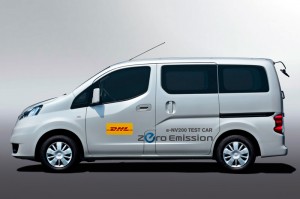
Nissan and DHL Japan to Test e-NV200 100% Electric Compact Van in Tokyo Metropolitan Area.
- Nissan and DHL Japan have begun testing of the 100% electric e-NV200 commercial vehicle in Tokyo
- Trial results and feedback will shape the development of the all-electric urban delivery compact van
- The needs of Nissan and DHL Japan coincided in the expansion of the environmentally friendly vehicles including EVs, leading to the realization of the field test
Nissan Motor Co. Ltd. will conduct a field test of the 100% electric compact van, e-NV200, in cooperation with DHL Japan, Inc. The Tokyo Metropolitan Area will serve as the testing ground.
The test will be conducted with a view to the commercial launch of the e-NV200 in 2014. Nissan will provide DHL Japan with a test model of the e-NV200 for approximately three weeks. This prototype will be used for the delivery of packages to companies and commercial facilities around the Marunouchi District of Chiyoda-ku, Tokyo. DHL and Nissan will evaluate the vehicle’s potential and the practical usability, taking into consideration its economic and environmental performance. Valuable feedback gleaned from the field test will be reflected in the future development of the vehicle.
Under its global environmental program, “Go Green,” DHL and its parent company, Deutsche Post DHL, have established a group-wide goal of reducing CO2 emissions by 30% from 2007 levels by the year 2020. To that end, it is putting in place initiatives such as introducing the use of environmentally friendly vehicles and setting up energy-conservation equipment in its facilities.
It is the first logistics company to introduce a carbon-neutral delivery service, DHL Go Green, and has plans to make the progressive switch to electric vehicles in Germany, where Group Headquarters is located. As part of this active promotion of environmental activities around the world, DHL Japan is also currently in the process of considering the expansion of its fleet of environmentally friendly vehicles, including the introduction of electric vehicles (EVs). The needs of Nissan and DHL Japan coincided in this aspect, leading to the realization of the field test.
Nissan is running this kind of proving test with several large commercial fleets to understand how the e-NV200 test car performs under real operating conditions. Tests have been conducted with several companies, including British Gas, Japan Post Co., Ltd., AEON Retail, and Saitama City. So far the eNV200 has received positive comments for its quiet, comfortable driving with no emissions and low noise, CO2 reduction, and generous carrying capacity. Feedback will help Nissan tailor future battery-powered light commercial vehicles to better fulfill exact customer requirements.
The 100% electric compact van, e-NV200, is scheduled for launch in 2014. As Nissan’s second global electric vehicle, it follows Nissan LEAF, the world’s first affordable 100% EV for the mass market.
In addition to further reinforcing Nissan’s zero-emissions leadership, the launch of the e-NV200 represents significant innovation in the commercial vehicle market. The model offers all the spaciousness, versatility, and practicality of its base vehicle, the multipurpose commercial van NV200. It delivers advanced performance that can only be achieved through the powertrain of the Nissan LEAF. The e-NV200 provides exceptionally smooth acceleration and quietness, driving characteristics that are unique to EVs, while emitting no CO2 emissions at the point of use. e-NV200 displays great potential for businesses, with its advanced telematics system and power-supply function in the cargo compartment. Also, the model’s enviable running cost – a priority for most companies – will be highly attractive when competing in the commercial vehicle marketplace.
As a leader in zero-emissions mobility, Nissan is developing EVs while engaged in comprehensive efforts to expand EV use and promote sustainable mobility. These initiatives extend from producing lithium-ion batteries, and recycling and reusing these batteries, to developing the EV charging infrastructure and proprietary speed-charging equipment. The Renault-Nissan Alliance has already arranged more than 100 partnerships related to zero-emissions mobility with national and local governments, and corporations, throughout the world.
Source; Nissan Newsroom
